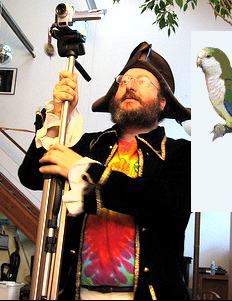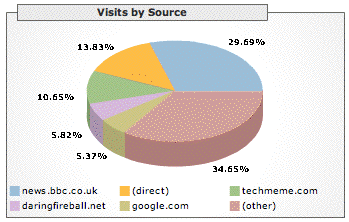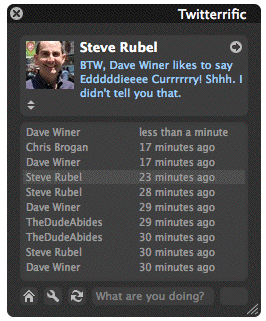
|
|||||||||||||||||||||||||||||||||||||||||||||||||||||||||||||||||||||||||||||||||||||||||||||||||||||||||||||||||||
World's first flash TwitterTeleConference! Call: 1-218-486-1300. Join Bridge 513332.
When I started installing XP, foolishly I thought "How cool is this, I get to use my Mac, and put the PC in a little window, even hide it if I want. And it all runs at native speeds!" I was happy, until I hit the first stumbling block, a dead-end, deal-stopper, brick wall. Joe Cicinelli says it took 10 tries to get XP to install. Gulp.
12:05PM Pacific: It worked! Amazing. I've got Windows running on my MacBook. Exciting!! 12:37PM Pacific: It seems my computer should be heavier now that it has a Windows machine inside it, but it feels just about the same. I have Firefox and the OPML Editor installed in the virtual environment. Next -- get a copy of WinZip. Movie of my floor washing robot, Scooba, a gift from Chris and Ponzi, doing its thing.
My own two cents, when thinking about declining tech markets, something I've seen four or five times -- when a boom is tailing off is the best time to invest in truly new ideas. People's thinking has been going in one direction for a long time, so long that all the big or obvious ideas have been tried, many times, and people are creatively exhausted. It's a good time to change your assumptions, head off in a different direction. Everyone's been zigging, so now it's time to zag. Revisit early ideas that spawned the current boom that have been discarded, and continue the evolution by going in a different direction. Start with a blank screen and put someting interesting and simple on it. Aside to Mike: A domain you might want to grab. PS: Apparently Mike's post was an early April Fool's joke which I fell for. Oh well. What I said still stands, ironically, whether or not Mike is joking. Have a nice day (no joke).
David Brown has a theory about a way I might get XP to install on my MacBook. Don't you love DRM. It turns paying customers into hackers. Rex: When everyone blogs, all sides of a story can be aired. Keep blogging, you're going to be on the A-list. My second of two PC laptops died this week, and rather than get them repaired, or get a replacement, I ordered Parallels and a fresh copy of Windows XP. Both should arrive today. Back in Sept 2005, I bought a cheap Mac because I wanted to test new versions of the OPML Editor on the Mac before releasing it. Now, having completed my unintentional migration to the Mac, I'm now in the mirror situation, needing a Windows machine so I can make a new build of the Windows version that works. I don't think this means I'm going back to using Windows, however. Alan German: "Parallels is so good for my purposes that I've never even tried BootCamp."
A reminder from Kevin Tofel that Apple is no better when it comes to wasting users' time. You can't buy better service by spending more money -- if anything Apple's service is worse than what you get from PC manufacturers, even though you pay a lot more for the computer. Lots of changes happening in my web in the next few days. Until a few days ago, I had two servers at a colo facility in Somerville; they were my original life-after-UserLand servers, started in 2003. One was used for weblogs.com and the other for everything else. Eventually weblogs.com migrated off the server onto a Linux machine at ServerMatrix in Dallas. Then when my business with Adam Curry was forming, in 2004, I rented two servers for our podcasting work -- on Sunday those servers are finally going away. After this corner-turn I will go from seven servers to three. One of the remaining servers is running only SYO, which I must admit is suffering from lack of attention. But there is some small hope of reviving the project. At the same time Manila sites are seriously under attack, I'm not up on the exact vector or what the company may be doing to deal with the threat. However, we are having a board meeting a week from today. Writing about the situation with Russo & Hale here apparently had a good effect. It's the old sunlight as disinfectant thing. Meanwhile, the Manila server I set up at Harvard when I was there is back up, but only for a very short period of time. The fragility of this server is one of the things that's inspiring my interest in future-safe systems. Back in 2003, with the help of Jack Russo, representing UserLand, we transferred the RSS 2.0 spec to Harvard, for safe-keeping through the years, hopefully decades, maybe longer. I think now, in 2007, it needs one more little bit of help to turn the corner to be relatively safe for the next century or so (knock wood, praise Murphy).
Too many lawyers!
Yes Virginia, no fooling, April 1 is the birth date of this weblog, and this April 1 (Sunday) is the 10th birthday. In the spririt of item #2 below, I'm going to offer the full archive of Scripting News, a full decade, downloadable in a single archive, free, no charge -- let's party! NY Times: "Many of the fired prosecutors were investigating high-ranking Republicans." NPR: "Under questioning from a string of antagonistic senators, Sampson repeatedly contradicted his former boss, Attorney General Alberto Gonzales." Ponzi and Chris sent a really cool house-warming present. Story of My Life.com, "launching soon, is a unique way for you to preserve your life's memories and stories, pictures, videos and more to be treasured for generations to come." IHT: "King Abdullah of Saudi Arabia has told Arab leaders that the U.S. occupation of Iraq is illegal." Rex Hammock: Why I Blog. Steve Rubel: The Value of "Why I Blog" Posts. Fox News: "As Cathy Seipp lay dying, her nemesis took his parting shot on the web."
2. I'd like to be able to pay a web company like Amazon or Google a one-time flat fee to host my content for perpetuity. I'd deposit my writing with them, on the web, and not worry about whether or not my heirs will keep paying the hosting bills to keep it alive. Today I'm hosting the weblog of my departed uncle (who I miss terribly!), I don't mind doing it, but what will happen when I pass? I'd gladly pay $10,000 to be sure my site and his survive my death. Long-lived institutions like Harvard University or Mount Auburn Cemetary (in Boston), even insurance companies, could get into this business. Think of it as a personal endowment, it would work like the money richer people leave behind as memorials to their own lives, or lives of loved ones.
4. I'm in favor of ideas that capture the imagination, because I think we don't have enough of them when it comes to solving problems we must deal with. If I were Bill Gates, I might send a copy of Windows Vista to Alpha Centauri (of course with a computer to run it on) and hold a contest for kids to write software that aliens might appreciate. One can be pretty sure that because of global warming or the war on terror or loose nukes that our terrestrial backups probably aren't much good, long-term, but the stuff we send out into the cosmos might actually survive us. Do we have any ideas worth preserving? Hmmm. We might generate some if we had a reason to. Not looking for sympathy or anything
Just want to get on the record as Michelle Malkin did yesterday, that the kind of abuse that Kathy Sierra reported is not anything new, it's been going on for a very long time. Without going into detail, because I've found that just creates more of the kind of crap we don't like. People aren't going to like this, but it's true -- when a woman asks for a riot she gets one, and almost no one comes to the defense of a man who is attacked. Who's more vulnerable? Well, honestly, it's not always a woman. Those who provided the riot Ms Sierra asked for, unknowingly, I'm sure, attacked at least one person whose health is pretty fragile. I wonder how y'all feel now that you know that. I wonder how you'd feel if that person died in the midst of the shitstorm. Someday if we don't change the herd mentality of the tech blogosphere, that is likely to happen. I don't want to be part of the herd on that day, that's why I won't join herds. Yesterday I said I don't support the kinds of rules of conduct that Tim O'Reilly was calling for. Giving Tim the benefit of the doubt, I think he doesn't fully unerstand what was going on in the blogging world, and I'm not claiming I do either, but he was running a conference this week, and it couldn't have gotten very much of his attention. And you know what, that's a good thing, and we should all strive to keep our perspective, before we create the kind of fantastic graphic imagery that was created around this event. If anyone had a reason to want retribution against the "mean kids" -- I have it. They've been on my case for years. They're really nasty people. That's why I have some credibility when I tried to put the brakes on the mob. Next time, let's have some more people do that too. To the credit of the mob, very few people attacked me for doing what I did. That's cause for hope! At least some sense of perspective remained. And out fo all that was said I think Doc nailed it -- we got used by a few trolls, and no one knows who they are. Everyone played a role in this, the people who stopped blogging, the people who threatened their friends, the people who called it a gang rape, and yes indeed, the mean kids. But they've paid enough. It's time to welcome them back into the blogging world, and in a few weeks, ask them to reflect on what they learned. These are all intelligent and creative people, who have acted badly. But they didn't deserve what they got. The time to act is way before it escalates into the kind of post that Kathy Sierra posted. There should be people who are willing to provide personal support to others who are ostracized this way -- and that support should be available regardless of gender, age, or other circumstances. I won't support anything that only offers support to women and not men, we must help unpopular people, even people who we think are mean. It's no crime to be unpopular, and you can measure our humanity by how good we are to people we don't like. Sometimes people say things that are designed to hurt other people. Locke, Sessum, Paynter and Head Lemur are the kinds of people who do that. I read yesterday that Denise Howell considers them friends. I've asked other people who do, like David Weinberger and AKMA how they can support that -- I asked when I was a target of their attacks. All I got was silence. I think people need to come to terms with that, and speak up whenever people say or do things designed to hurt other people. That's how we prevent explosions like the one we dealt with this week. So if we have a code of conduct, it can't just talk about how trolls behave, because truly we have no control over that. It should talk about responsible people whose names we know with reputations they care about -- what should they do when abuse happens? That is something we can do something about. There should be 18 steps before something like Kathy Sierra's post appears in the midst of the blogosphere, and it shouldn't come from teh person who has been victimized, someone else should stand up for them and explain what happened. For so many reasons this is a much better way to go, and I'm sure the victim would like it better too (I speak from experience). You know there's nothing worse than being hunted and having no one care enough to speak up for you. That's what we need to work on folks. And when we solve this problem, we can go to work on Iraq -- because that's much heavier and much worse, but kind of the same thing. Why aren't we angry at all the wasted lives? I think we'll find the answer to that question is related to why we're so bad at dealing with situations like the one we tried to deal with this week. I gotta go now. See y'all later. As Jerry sang: "I know the rent is in arrears, the dog has not been fed in years... "It's even worse than it appears." Which has been the motto of Scripting News for quite a few years (it's the universal response to people who flame), and btw, is the weblog version of WMSS.
Is Apple un-hacking user-enhanced AppleTVs? If I'm not mistaken that's Mike Arrington, Chris Pirillo and Robert Scoble in the latest JibJab. Good question from The Dude Abides. CBS5-TV report on Twitter with Scoble. News.com: "Apparently, Facebook wunderkind Mark Zuckerberg dropped out of Harvard before he had a chance to take any history classes."
Now the next step is to wonder what the next step is. I've been following the digging work that Nik Cubrilovic and Steve Poland have been doing, with great interest, particularly the report yesterday on the upcoming Twitter API feature that will allow users to direct private messages at invidual users. Both Steve and Nik have observed that names in the Twitter space may become quite valuable in the future. And Nik observes that the Twitter folk may have made a mistake by not reserving some of the juiciest names for themselves, like GET, for example. @get "berkeley weather" If you play it out, the Twitter command line could evolve to be something much like the Unix command line, with an important difference, it's world-wide in scope. Before you lose your breath, this is hardly the first such command line, the address bar in the browser has a similar property as does the search box on Google (of course, any search engine). But Twitter's would be newly interesting because the thing it wires together, better than any environment before, is something we're all interested in -- people. So inevitably, a query about the value of namespaces leads you to wonder if there will be TwitterClones, web-based services that emulate the Twitter API, that keep internal data structures similar to Twitter, and most important, peer with Twitter, the same way Twitter peers with IM and SMS systems. This is as far as I got in my thinking when last night I decided to ask Les Orchard, a developer I know for quite a few years, and who I've worked with on a couple of projects, both of which use the kind of technology that would be required for such a project -- What if there were an open source implementation of Twitter? Nik Cubrilovic happened to be online at the moment and he jumped in with an idea. Les confessed that he was thinking of doing such a project. I thought to myself that there must be a lot of developers thinking about this right about now. We agreed it was an interesting question, and I said I'd write it up on Scripting News, which is what I'm doing right now. What do you think? Is Twitter important, like web servers, or blogging software, so important that we should have an open source implementation of something that works like Twitter and can connect up to Twitter? Where are the tough sub-projects, and how much does it depend on the willingness of the developers of Twitter #1 to support systems that connect to theirs? If you have something to say about this, either post a comment here, or write a blog post, and point to this article and your piece will show up in this Technorati query. Les Orchard: "Twitter is not just a technological thing." Amen.
A QuickTime screencast with Ryan Kennedy, Jeremy Zawodny and Matt McAlister from Yahoo, explaining the API and what they can do. It sounded to me like the API allowed developers to create new user interfaces or "skins" for Yahoo's mail, through SOAP or JSON interfaces, but they said that it could do more than that. I'd like to see another huge Internet infrastructure company provide what Amazon does with S3, and Yahoo certainly qualifies. This API is not that, but it's still a good thing that more of the user-level services on the net are being opened through APIs. And Yahoo is one of the leaders in that effort. Wes Felter: "The standard API for email is IMAP." Wikipedia: "Presumption of innocence is a legal right that the accused in criminal trials has in many modern nations. It states that no person shall be considered guilty until finally convicted by a court." Doc Searls: "If Alan is right, everybody on this giant thread has been taken for one of the oldest rides in the park." Next time -- think before you trash someone, no matter how much you dislike them, especially because you dislike them. It takes courage to stand up to a mob, but that is the best of what it means to be an American. Postscript: I agree we need a blogging code of conduct, but not the kind of code these people have in mind. Mitch Ratcliffe: "Trolls created the impression of a crime and sat back to watch human nature show its worst side." Scripting News has been a hive of activity this week, with lots of flow coming from the BBC and TechMeme. But it's worth noting that while these sites are massive flow-builders, another high-flow site that I'd bet not many of you are aware of, is also making a huge contribution. The pie chart below illustrates.
A link from Daring Fireball keeps everything moving. It's a gift from heaven. Thanks so much! I'm not worthy I'm not worthy. All that is important, but I'd be remiss if I didn't also point out that the all-time authority champion for my site is, according to Technorati, TechCrunch. Mike, thanks so much for helping Scripting News stay on the map!
Anyway, Russo & Hale made sure that they loom large in my world, now I'm showing them, hopefully, that I can loom large in theirs. I think some of their current clients will soon be asking them why they are suing one of their former clients without even trying to negotiate a settlement. Could it be that they're using the fact that they have free legal service, and the former client has to pay for his? To me, I liken it to a programmer leaving a virus on a client's computer, and then coming back a few months later and asking to be paid to remove it. That would be highly unethical, and would get someone thrown out of the Programmer's Union, if there actually were such a thing. But being who I am, I can't possibly get totally serious without throwing a little humor at it. So when I write about Russo & Hale, I try to find some pictures of pairs of people or things that somehow communicate about the issues swirling around Jack and Tim. Anyway, next time they file a frivolous action against me, if they ever do (knock wood, maybe they won't) it'll all be out in the open, and y'all will understand what's up. Yours in transparency, Dave Winer
Russo & Hale: How to settle the lawsuit
So here, in a nutshell is what I think we should do. First Russo & Hale claims that weblogs.com belonged to UserLand. I don't agree, but suppose for the sake of argument we concede the point. Not coincidentally, just before I started operating the site on my own server, there was an offer from another company to buy weblogs.com for $250,000. I didn't want to sell it, for a variety of reasons. It's lucky we had that offer, because that clearly puts a value on the service at the time of the transfer. From that point, there was a lot of work, a lot of rewrites, a lot of technical challenges (remember the June 2004 explosion), a lot of risk, and huge growth, which resulted in a sale, after much negotiation, to VeriSign.
However, before I even got off the plane, I was getting emails from Russo threatening to sue me. Note that up until this point, Russo was my attorney, UserLand's attorney, secretary, board member, shareholder, and friend! Before I could even get one word in, he had already escalated to suing me. He never even picked up the phone before he started getting legal with me. And as he taught me so well, when that happens, you have to get a lawyer to do your talking, which is exactly what I did. And now two years later, we still haven't tried to work this out as honorable gentlemen. People may be wondering why an attorney is suing his former client, without trying to work it out, and honestly so am I. Anyway, if I were an arbitrator here, I'd say we're pretty lucky there was a clear price set. So let's do the math, distribute $250,000 to UserLand shareholders, according to ownership, shake hands and let's move on with our lives. I'll overlook the fact that Russo & Hale forced me to waste over $50K on legal fees. And most important to most of the people reading this, we get to focus on getting UserLand working again. Doesn't this seem eminently reasonable? Microsoft mistakenly sent this reporter his own dossier. Chris Anderson has the actual dossier, in a PDF. Steve Goodman visits a Phnom Penh amusement park. Seattle P-I: "Humane law enforcement officers discovered 110 parakeets in an apartment in the 4200 block of Ninth Avenue Northeast in Seattle on Tuesday." The Truman Show anticipated justin.tv. TechCrunch: Yahoo Mail offers Unlimited Storage. Ars Technica: "Get ready for EVDO Revision B." Wired looks at its own past, which includes mine. Just read this article on TechCrunch about a new feature in the Twitter API. I have the whole API covered in the OPML Editor, no user-level functionality yet to report, but I'll have an update for this feature as soon as possible. It's great to see them evolve the API. It's a pretty nice one. Easy and quick to implement. BTW, I've noticed that Technorati now includes Twitter references. Might have some effect on the rankings on TR. Nik Cubrilovic and Steve Poland on Twitter keyword squatting.
I don't know Kathy Sierra, but I do know and have been abused by Chris Locke, Frank Paynter and Jeanne Sessum (and quite a few other people). I'll tell you what -- the mob that's going after them looks a lot more dangerous than they do. Locke and Paynter are pretty harmless, although they are nasty mofos, on the net (which is an important distinction). Sessum is a champion sexist male-basher, a real piece of work. I've never met her, and if I had the chance, I'd run the other way. Which is what I wish the mob of well-intentioned do-gooders would do. On this one, I take the side of the mean kids, because no one else is, and I have a soft spot for people who are being attacked by a mob, no matter how pathetic they are. After posting about the future of UserLand, a lot of comments, all constructive. What a change. It used to be that when we opened this kind of discussion, the users were crowded out by flamers. It feels in a way like we've popped the stack back to 1995 or so, when everyone in the then-nascent blogging world was full of excitement and hope, and the negative stuff hadn't shown up yet. The world was smaller then, and now it's smaller again.
I remarked in a comment yesterday: "The way this company is structured, the people who are central to the support of the product have no stake in its success other than they get to use it. For a company that has played such a central role in leveling those kinds of structures, it has a pretty conventional structure of its own." With so little to lose, it seems, we could make some big changes, and try creating a company that rewards its community when it succeeds, in a more substantial way. Sunday night's episode was the last of the HBO series Rome, which became one of my favorites. I didn't know the season was going to end with that episode, but as it proceeded it was clear that they were wrapping things up. Without spoiling the end for anyone who hasn't seen it, I just want to say, it was a satisfying end, not as dramatic as Six Feet Under, and not the disappointment of Deadwood. Something inbetween. Satisfying yet a bit disturbing. In the end it was the story of friendship between two Roman soldiers and the love these men have for their children. A sweet ending to good story.
Colorful Berkeley living room on a rainy day. AP: Bush impeachment on the table, Hagel says. 60 Minutes podcast, useful format, broken into segments.
It seems to me that this is unfair to the users of the Manila, Radio and Frontier. I watch them ask questions on the mail list, and help each other, but what hope is there for the future? Will there ever be a new release of the products? I see small fixes come sporadically, but I don't know where they're coming from. So I wonder what the users think-- what kind of future should UserLand have? Do you think we should try to revive the company and products, or perhaps it would be better if we GPL'd the remaining software, and let the community try to take care of itself? (Note that I am in the community myself, I continue to use the products.) Post a comment here if you have some thoughts about this. Doc Searls pays for Radio. He says: "I have great appreciation for Lawrence's reliable and tireless help over the years." I got a link today from the technology page of the BBC. Aside from delivering serious flow (thanks!) it's great to have these ideas heard, esp since they're about combining the power of amateur and professional media. In this case, the link itself is a sign of hope. PS: I have a column in the pipe for the BBC. Hope they run it soon, it's mostly about archiving for posterity, so I guess in this case, it'll keep. I've been writing about ways to integrate blogging and news for many years. I keep coming back to it, hoping "now's the time" -- only to find out that it isn't. Well it appears now is the time. Maybe blogging has matured to the point where it's earned the respect of mainstream press, or maybe they've fallen far enough into the hole created by the Internet that they're giving up some of their assumptions about how news is reported. No matter, people are listening and listening is good. So I'm going to keep pumping ideas out, and hoping they help bridge the gap.
By now it should be obvious that bloggers are part of the landscape of investigative journalism. If you doubt this, do a little investigation yourself into how the story about Alberto Gonzalez and the US Attorneys is being managed. You'll find that this time it's a group of bloggers playing the role of Woodward and Bernstein -- the Talking Point Memo people, doing really kickass work. I've been reading Josh Marshall every day as the scandal has been developing. And he's getting credit from some of the professional reporters I respect. Paul Kiel from TPM was a guest on this week's On The Media, and Josh was a guest on Countdown with Keith Olbermann. I was proud of the Powerline guys when they brought down Dan Rather, not because I agree with their politics (I don't!) or because I dislike Rather (ditto!) but because the pros had gotten sloppy and careless, and they need the help we bloggers get from the communities we're part of, they need someone watching over their shoulders asking how they know this or that, or if maybe this reporter has a conflict of some sort. They often do. The Times has invented The People's Editor, in response to the Jayson Blair scandal, a job that's supposed to perform this oversite function, but it doesn't. So far, they've only chosen from their own ranks, people with careers to protect, that keep them from looking deeply into things people don't want looked into. Further, I can't send an email to this person and have it taken seriously. He or she doesn't read the blogs to see what we're learning about their reporting. I want them to have a blogger on their editorial page, two or three times a week, someone who comes from our world, someone who will hear what we learn. I know that even if they don't agree with my politics and vice versa, I will get a respectful hearing from most bloggers. That's a great first step for any publication to begin the integration with the blogging world. I suppose it seems risky, but you're going to have to take some risks, big ones, to turn this corner and survive.
Another thought before calling it a night. I am not a lawyer. I am not a judge. But I have done jury duty. And in doing so I became an amateur judge. The noblest kind of judge there is. It was a wonderful experience, and while, like everyone else, I felt inconvenienced at first to be dragged into court, by the time it was over, I saw the value in it, was glad I did it -- it changed my life forever, for the better. So when people wonder if it makes sense for every educated person to spend a semester in college learning to be a journalist, think of jury duty as being an amateur judgement, and then think how wise our founders were for designing a system where we are judged by amateurs, our peers, not by our supposed superiors, and ask yourself if journalism is any less noble a trade than judgement. I heard a report in this week's On The Media about a law in Rwanda that requires journalists to be licensed. The justification was that the law requires doctors and lawyers to be licensed, because a lawyer can lose your freedom, and a doctor can lose your life, and they found that in Rwanda that journalists can help create genocide. Pause for thought. Journalism is powerful stuff. Too powerful to be left to the pros. The United States is the Do It Yourself country. To the extent that we don't remember that, that is the extent we've lost our way. It's good that everyone gets a chance to be a journalist. That doesn't mean that everyone will be one, but it's important that everyone can be one if they want to. So teach the kids to be journalists, take the mystique out of it, show them how to vet a source, what integrity means, how to think for themselves. The gatekeepers are losing their power to keep us out. The naysayers can say their nays, but it doesn't change a thing. Over and out.
It could be that they love iPod because it's a hard drive that you can put massive quantities of free music on and take with you everywhere. It may have nothing to do with the cool UI (which I don't think is really all that cool). And Apple TV may be fun for geeks who have never had a computer hooked up to a HD TV, while its fatal flaw is --> no BitTorrent content, no Netflix content, just what Apple says you should have. It may solve the "problem" with the iPod that was really core to why people loved the iPod. That's just a theory, I don't have an Apple TV, but I do have a Mac Mini connected to my TV and on the net and I think that's the coolest toy ever, even after almost six months. PS: I wrote this as a series of Twitter tweets.
InfoWorld was the first tech publication that gave you sweaty palms when it arrived in the mail. This was before the web, so news came in weekly installments. When InfoWorld arrived, everything else stopped. I read it from cover to cover.
Is April 1, the 10th birthday of Scripting News. Right now, nothing special planned. If you have an idea, post something and point to this post. We'll all see it in Technorati. Ian Betteridge thinks my view of journalism is "frankly, nonsense," comparing journalism to carpentry. "This is as silly as saying that carpenters are middlemen for wood merchants," he says.
I suggest a visit inside the sausage factory. Ask a reporter what dumbing down means, and how they feel about the headlines that have appeared over their writing. Charles Hope: "Who can believe any breathless hagiography about journalists?"
Tomorrow's Cybersalon, at the Hillside Club, 5-7PM, $10, is entitled "Life After TV." Moderated by Andrew Keen, whose upcoming book is an embarassment to Berkeley, and panelists Mary Hodder, Evan Berg, and Joe Savage. I'll be in the the back dressed as a bird, and twittering away on my MacBook Pro, devising new ways to conquer the world. On Thursday I wrote about my intent to reposition Scripting News as a place where ideas originate, and it seems to be working. My piece about reforming journalism is now the #1 item on TM. Re-wiring the attention of the TechMeme bot, while it resulted in a short term loss of attention, seems to have had the long-term benefit.
The first bits I'm going to push is new script glue for the Twitter API, making it easy to write little apps in the OPML Editor (or Radio or Manila, for that matter) that use Twitter as a back end. I think some interesting pub-sub apps will be made possible by this. So, as I was beginning to test the new code, I created a new test account on Twitter, one of many that I've created, for each of the channels of content that my little robots are maintaining. This one is called simply enough "opml." Then something occurred to me -- exactly the right people are signing up to Twitter these days to make it possible for another bootstrap to occur, one that many people seem to want, as do I -- we could make Twitter the open identity system we've been looking for. Make your Twitter ID the one that you use to log on to other services. It seems we're going to go through that bootstrap anyway, and it also seems that if the Twitter folk want to do something good for the Internet they could. So I wonder if any of the identity gurus are watching this and see the opportunity? Anyway, I'm going back to my coding for now. system.verbs.apps.twitter is on the way! Tim O'Reilly is hearing rumors that the SF Chronicle is in "big trouble." It's a fascinating piece, a must-read, it's kind of scary to think that the mainstream press is going down without a fight. At a breakfast meeting yesterday with a CTO at a major print pub, I observed that the MSM guys love to hear Jeff Jarvis's message of gloom and doom, but feel threatened by my prescription for embracing the new media, a message of hope, of finding new relevance for the skills and experience of professional journalists. It's worth another try...
Second, embrace the best bloggers. How? Easy -- every time someone is quoted in your publication, offer them a blog hosted on your domain. This has a couple of advantages: 1. It gives the reporters the ultimate say on who gets to share some of your authority, who gets a chance to be the next amateur star. 2. It gives the reporters an incentive to only use sources that are qualified, it would improve the quality of your reporting. It also has a third benefit, as you expand the number of people writing under your banner, you also expand the reach of your publication, into school boards, local government, sports teams and businesses. It's also important because it's how you decentralize, aligning your interests with the "grain" of the web, as opposed to the current positioning, against it. Of course you run ads on each of the pages, that's your reward for sharing your authority with the people who used to be your sources (and who still are, in every sense). Now your reporters just have to read the blogs to find the new trends, the quotes for their articles. They will learn a lot and perhaps even start having fun, instead of (as Markoff puts it in the O'Reilly piece) feeling like they're at a wake. That's depression, and you can feel it in the articles they write, and you can't possibly dig out of a hole when you're depressed. You need to find a way to tap into the excitement of the Internet, to bring it into your publication. In the tech business they call this "embrace and extend." Eventually new businesses will form out of the messy brew of sources, editors and reporters you'll be supporting and in some cases, employing. The publishers and owners must also keep their eyes and minds open, be creative, no one knows the future, but there certainly is one, even if some days it feels like there isn't. Thanks to Tim for opening the door to this discussion.
Harvard's Manila server is down. Frank Barnako: Rocketboom may charge for shows. Andrew Baron: "Rocketboom will remain freely available." Dan Gillmor takes off the gloves. Russo & Hale, our law firm, sues us On March 12, I wrote a cautionary tale, part of the history of UserLand. The story was written in a general way, and raised a bunch of questions. Today I'd like to answer some of those questions. 1. It's really weird to be sued by your lawyer. Not a very nice feeling. Sort of like being made sick by your doctor, deliberately. 2. There are now two UserLands: The original company, and a new one which was formed in 2004 to market Manila and Radio, to create incentives for a new management team, and to settle claims by our law firm. 3. I stopped working for UserLand in 2002, for health reasons, but I never sold my stock. Today I own 90 percent of the original company, and more than 50 percent of the new company. 4. Jack Russo was UserLand's attorney, a board member, secretary and my personal attorney, from 1988 to 2005. 5. Russo and his law firm, Russo & Hale sued UserLand, Scripting News, and myself, in August 2006. Earlier this month, the court ruled to disqualify Russo & Hale from representing UserLand's shareholders due to conflicts of interest. Their strategy was clear -- to force me to spend a lot of money on lawyers while they used their own in-house, relatively inexpensive, legal resources. 6. In the 2004 settlement, Russo released all claims with UserLand and myself. He was compensated with a large share of the stock in the new company. He drafted the agreement, it was signed in his office in Palo Alto. 7. As I said in the previous piece, the company was in awful legal condition. While I take blame for that, as founder and former CEO, some of the responsibility must also lie with Russo, as the company's lawyer. PS: I wrote a review of Russo & Hale on Propinions. I've been trying to get someone to go in business with me on this idea, but it ain't happening, so what the hell, here it is. Start with a two-person video crew, like Andrew and Joanne, in New York, and every Tuesday, rain or shine, go to Times Square and interview 20 or 30 people, asking a very simple query. Tell me about a product, service or company you hate, and why. Then on Wednesday morning, release a video, very well branded, through every channel imaginable, with the best interview from Tuesday. By best I mean most enthusiastically hateful. The company who most screwed someone recently, told graphically and personally, from the point of view of a user. Of course the companies who are targeted may try to sue you, but what would they sue you for? You're just relaying a customer's experience, told in the first person. Buf if they sue, so what. It's great publicity, the best. Then one day, probably not very far into it, one of the companies will get the idea that if they respond to the complaint, people might actually like them. They might turn hate into respect, derision into love, if they do the totally un-American thing -- listen to a customer, and respond as if they care. "Yes, we know we let you down, but we promise to fix the problem, and to do better next time." Then you know what happens -- sales soar. This is really great marketing. Much better than ads that say "Our product is great, we don't suck, buy buy buy." Because everyone knows you suck. There's no such thing as a product that doesn't suck. But we're going to give our money to the company that knows that and is trying to do better. I think this is a gold mine. The video producers that capture people's imaginations with real-life product nightmares will own the brand of the future in advertising, because this is the future, user-perspective marketing, where the users define your products, and you make the products they want you to make. Same with politics, btw. I've pitched this to lots of people in the video world, but they don't believe. Now at least my stake is in the ground. I bet that by this time next year, someone will be doing a great job of this kind of video, and they'll be raking in the bucks from the people who used to waste money on the old kind of advertising. I'd love to work with a team that really wants to go for this, maybe even invest. Todd Cochrane (via email): "The man on the street proposal you have is how I got GoDaddy as a sponsor. I bashed the hell out of them on a issue they responded very publicly and fixed the issue and those actions have earned them a significant amount of money through my show. While I still jump on them when they screw up I do it publicly and guess what they generally fix it. I love your concept and think it is a great one." Ryan Tate: "One our most talked about stories at the Business Times a few years ago was one with some architects complaining about what buildings they hated most."
Randy Morin: SEOing Dave. Heh. Steve Rubel: Twitter may face huge SMS bills. Michael Gartenberg reviews and positions Apple TV. Marc Canter nails it. As long as war is incredibly profitable, the US will continue to "solve" every problem with war. I spoke with Micah Sifry this afternoon and we agreed that I would do a keynote at the Personal Democracy Forum in New York, on May 18 at Pace University. The topic is the importance of open standards for all kinds of tools and devices. As with the Public Media conference last month, I'm going to write a series of essays here to prepare for the talk in New York.
Not sure why people think this movie is so great. But IMAX sure is impressive. If I were as rich as Mark Cuban I'd have one installed in my house. McNulty from The Wire is in the movie. It was funny to see him speak with a British accent and pretend to be an ancient Greek. I guess you can tell I didn't get sucked into the plot. I don't think you're supposed to come away thinking the movie is funny. Randy Morin notes that I've been gradually changing the way Scripting News works. It's true. I'm trying some experiments, to learn, but not to improve the rank of the site, rather to make it more useful to readers, and make it more likely that the things that I want to get attention, get attention.
So I don't think his system is fair, or right. But unlike the B-list complainers, I'm not going to try to guilt Gabe into fixing it. I think a route-around is the web way of doing it. Make it all happen outside Gabe's world, and that will get his attention. Now I may not be into SEO, but the changes are improving my rank, nonetheless. I've noticed that my articles now are showing up closer to the top of searches in the areas they cover. Of course I like this. Nothing wrong with a little respec! BTW, I've been doing this with O'Reilly for a long time. I don't get invited to speak at their conferences, but they talk about what I want them to talk about anyway. Blogging, RSS, podcasting -- these are always big topics at ETech and the Web 2.0 conference. Same with SXSW. You think people don't know I'm behind these things? Heh. Of course they do. You know the old Godfather rap, keep your friends close, but keep your enemies closer. Seems Tim and Hugh could learn a few tricks from Don Corleone.
For example, at least some of the universities didn't get the right to re-license scans of books that Google hands back to them. It appears none of the libraries thought the whole thing through to the point where they realized that after it's all done, there will be one great university library, Google's, and it will be a commercial entity. It's one thing to sell a food concession to McDonald's, but the library? How much more central to the being of a university can you get? Had they worked together first, it's likely they could have negotiated terms that allowed them to remain in business after Google is finished sucking up all their content. Peter Brantley, who negotiated for the University of California, wrote two blog posts about his dealings with Google. One lyrical and sad, and the other apologetic. Both are revealing and worth reading. Remember, in all this, Google is a rich company whose first responsibility is to its shareholders. Today they're riding high, but in a few quarters, they may have trouble making their numbers. It may have seemed Microsoft would always be on top, and no one could get fired for buying IBM. Who knows what Google will do with the trust when they need the money. And while some of the schools are private, and responsible only to their trustees, others are public, and repsonsible to the people. What right did they have to trade away the people's property, and what did they get in return? No one knows, yet. The new version of the RSS-based updating code (some call this appcasting or codecasting) is available for testing. I posted instructions for "brave souls" on the mail list. If all goes well, these changes should be integrated in the downloadable version of the editor, along with fixes for Vista and IE7, in a couple of weeks. Still diggin! Naked Jen says what's obvious -- the President is obstructing justice. Congress is a co-equal branch of government. It does not serve at the pleasure of the President. The Guardian -- yet another UK newspaper with reality-challenged headline writers! Political mashup art, across two centuries. A vision of the future of Twitter, with twits from JetBlue, Starbucks, your favorite baseball team. Nick Carr: Two views of Web 2.0 in business. Brandon Paddock flamed by Walt Mossberg? TV links is a watch-in-browser public DVR. Scripting News is not my first blog, it's not even my second. The first was the News page of the 24 Hours of Democracy project, started on 2/15/96. It ended shortly after the project was over, on 2/27/96. My second blog was the Frontier News page, started shortly in March 1996. It wasn't until 4/1/97 that it was lifted up to the home page its name was changed to Scripting News. So -- April 1 is the 10th anniverary of this weblog. PS: David Dunham wonders if DaveNet wasn't a weblog. I wonder about that too.
I've been watching CNN this morning as I drink coffee and catch up on news on the web.
So I switch to MSNBC, and damn if they aren't covering exactly the same story. Same on Fox. In six years he may well be a soldier, in Iraq, fighting for his life, and they'll be obsessing about another 12-year-old. PS: I turned off the TV and tuned in the WNYC webcast. At least public radio hasn't sold out yet. Three American soldiers died in Iraq today. Roadside bombs. President Bush is standing by Attorney General Alberto Gonzalez. The President is going to Kansas City today. 3000 more emails were disclosed today in the scandal brewing around the fired US Attorneys.
CNet searches for the creator of the first blog. That would be Tim Berners-Lee, whose first website was, in every way, a blog. A couple of comments. 1. Not sure how he tried to get in touch but I never got a call or an email. 2. I don't want to take anything away from anyone else. Lots of people made weblogs what they are today. Why not be inclusive. 3. They call me "irascible." Not sure if I've met either of the authors in person, I wonder how they formed that opinion and why they feel the need to label people like that. In another, related article they interview the creator of Finger, who says the ideas of blogging originated in bulletin boards. In any case, with all due respect, I think the CNet article misses something important as they make light of my claim to having bootstrapped blogging. The first blogs were inspired by this blog, in fact many of them, including Barger's Robot Wisdom, used my software. If you go to BlogTree, a site that asks bloggers to say which sites inspired them, you'll see how many self-declare as originating from the Scripting News community. How you summarize that effect is up to you, I call it a bootstrap. I was trying to disperse the community that developed around this blog, from the beginnig. The goal being to inspire other people to do the same as I was doing. Jason Kottke once called me the Johnny Appleseed of blogging, and that's something I'm happy with. That was my intention. To people who say the ideas were obvious, I don't think they were. I tried to convince many, including leading VCs and tech companies, to help bootstrap blogging, but I was left to do it myself. Peter Rip, a man I've never met, but would like to, wrote an amazingly insightful article about where we're at in web applications these days. "The Web today still resembles MS-DOS more than MS-Windows. Every website is an island, an island that knows nothing about any other website. This is no different than the world before the Windows Clipboard. All 640KB of memory was available to whatever application was running. The point of integration was the User. As it is today." I have lots of ideas I'd like to share about where we can go with the formats we already have, but I can't get past the gatekeepers at the conferences Mr Rip mentions in his piece. OpenCongress: Iraq bill tests the Democratic leadership's skills.
Apple has been pushing updates of iTunes with features that tease about AppleTV, but today they came right out with a fairly complete pitch for the imminent product, which some think will ship later this week, perhaps as early as tomorrow. I just got an email from Ole Eichorn saying he got a notice from Apple that they've shipped his Apple TV. So that's it, whatever it is, it's shipping. I feel like I've done my homework, not sure if I'm going to get an AppleTV, it depends on how heavy the DRM is. I suspect it will be pretty heavy. I've had an iPod since they came out, but I've never bought a song at the iTunes music store, because of the DRM. I also have a Mac Mini on my TV, acting as my Internet-based DVR. I pay Comcast $115 a month for subscriptions to all the services I use.
The point is this -- the open DRM-less world is tantalizingly close to delivering the nirvana we seek, entirely as a labor of love. If we somehow could get clearance from Hollywood to go ahead (unlikely) we could take the last few steps to make it user friendly. Compare that against what Apple will offer us in the next few days. Maybe Apple will challenge Hollywood, the open letter from Steve Jobs offers a sliver of hope. We'll be watching, very carefully. This is Today's Links with a cute name. Anti-Hillary ripoff of Apple's famous 1984 commercial. TechCrunch compares Twitter, Dodgeball and Facebook. The Mayor of Salt Lake City, Rocky Anderson, calls for the impeachment of President Bush. SLC is the capital of Utah, which is one of the most conservative states in the US. NY Times: "John W. Backus, who assembled and led the I.B.M. team that created Fortran, the first widely used programming language, which helped open the door to modern computing, died on Saturday at his home in Ashland, Ore. He was 82." Scoble notes that geek productivity is up 200% today.
That set up the moment of truth, when I'd find out how much faster the Extreme is for the crucial job of moving media files between a server and a laptop. The answer: it's quite a bit faster. I find numbers fairly meaningless, so I took a movie of my MacBook Pro, in the kitchen, copying a movie from the Mac Mini in the den.; Movie: Demo of performance of Airport Extreme router. Now I have another problem. I need the Denon receiver to have a local IP address so I can control it via Firefox. With the Netgear router I looked it up on Attached Devices, and entered its address in the browser, and it just worked. The Airport Utility app doesn't seem to have a way to find the address of attached devices.
Personally, I think they're feigning suprise, pretending they're shocked, when they use language like that too. What do they think about Microsoft's Internet strategy. When was the last time they created some software that made you think they liked software? Postscript: I've received a few comments saying the reporter was justified in quoting Scoble saying something he didn't say; and even if the headline was wrong, it isn't the reporter's responsibility. This is of course nonsense.
Try saying Fresh Fish Flesh five times fast. Then add a "y" to the end of each word. Some very strange sounds end up coming out of your mouth! Since I had to restart the NY Times river robot to make the Twitter feed work, it was a small matter to restart the HTML page, the one that works so nicely on mobile devices like a Blackberry.
Anyway, as long as the program is running, it's a small matter to generate the HTML. But I'm not committing to running it indefinitely. Just for now.
Naked Jen in South Africa press
They quote a top blogger (Scoble) saying "Microsoft sucks." The only problem is he didn't say that. Another accuracy-challenged "real" reporter.
I thought transfers between my laptop and a server would be considerably faster, but there's no discernable difference. Maybe I still need to buy the $1.99 enabler software, even though this laptop was purchased after they shipped the new Extreme. I was confused at first when I ran the Airport Admin Utility after installing the new software. It still complained that it wasn't compatible with the new version, but then after reading the MacInTouch review, I realized that they were no longer maintaining it, and ran the new "Airport Utility," and all was good. The setup took just a few minutes, and went smoothly. A big change was announced last night, TechCrunch has a CEO, ex Fox Interactive acquisitions director, Heather Harde. The amazing thing is that TechCrunch has a CEO. What started as a labor of love by my friend Mike Arrington, a man with a hidden gift for quickly grokking the value in a myriad of web projects, and a deep genuine passion for entrepreneurship, had become first a juggernaut, then a nascent empire, and now shows signs of becoming a for-real empire that harkens back to the heyday of Pat McGovern and Bill Ziff. I met Heather briefly at Gnomedex last August in Seattle. I know Mike has had his eye on her for a long time. I'm glad he's getting to focus on content, and can only imagine what they have in store. Along with everyone else, I look forward to watching this story unfold. I was trolling around looking for another Twitter-related project this morning and I came across a comment from a guy who works at the NY Times saying that: 1. The other nytimes account on Twitter is from the Times itself! 2. They've been there since March 5. 3. They're planning to do more with feeds in Twitter. 4. And they welcome competition. My first comment to all that: Awesome! I didn't know who was doing the NY Times twitter-river, but it's great that it's the Times itself. I love it when we get into this mode, where things are moving so fast when on March 18 you can boast (legitimately) that you've been doing it since March 5! That's when you know we're rising up the curve quickly. Reminds me of when podcasting was catching on. I have more stuff planned too. Let's have fun! PS: Jacob Harris from the Times elaborates in a comment here.
Ponzi is over at my house checking out the RSS Couch, and setting up her new MacBook. I took a movie as she was getting started. We had a bottle of Ponzi wine while we were setting it up. Hic. Kevin from JK, an excellent mobile gadget blog, suggested he might like to see his blog as a Twitter River, and I said it would be my honor to provide one. Having generalized the code this morning to make it work for Wired in addition to the Times, it took all of 15 minutes to get it working for JK. PS: It's kind of obvious I should do it for Scripting, too?
Patti's mom, who called her Tricia, loved her music as much as we do. Mom told her, on the day she died, that when she was inducted she should play her favorite song, the one she played while she was vacuuming. Smith told the story so sweetly, so you had to wonder what the song would be. She turned around, put the mike to her mouth and screamed: "I don't fuck much with the past but I fuck plenty with the future." Mom's favorite Patti Smith song, it turns out, was Rock & Roll Nigger. Kind of the punk rock equivalent of We Make Shitty Software. I love Patti Smith. Google's discography for Patti Smith. Michael Calore at Monkeybites wonders if someone will make a TwitterRiver for Wired News. Okay, here it is. They have 16 blogs, all of which have feeds. If they provide an OPML reading list for all those feeds, I can add them to the river. I'm kind of tempted to do it myself. Later, after I get some sleep. (It's 4:30AM.) Tom Newman sends word to check out the following Twitter names: cnn, cnnbrk, bbcnews, bbc. He also points out that there's a nytimes account that reflects the contents of the main NY Times feed. The nyt newsbot I set up reflects the contents of all the Times feeds. Tonight I'm working on generalizing the TwitterRiver tool so the same code can process multiple accounts as well as multiple feeds and correctly route news items between them. The reason why it's such a good fit is that Twitter is a river, I saw that immediately. It's what I've been preaching. They got a lot of people to think in terms of River of News. So of course I'm going to jump on that bandwagon. I'll take victory however I can get it.
It's set to post one new story per minute, as long as they are available. I may decrease that to once every three minutes or every five minutes. I'm interested in what people think. "All the news that's fit to twit." How important it is for publications and publishing platforms to be open. Because Twitter has a public API that allows anyone to add a feature, and because the NY Times offers its content as a set of feeds, I was able to whip up a connection between the two in a few hours. That's the power of open APIs. Rex Hammock: "Hey, Twitter is a newsreader." Don Park: "There he goes again." A new feature! When Today's Links would only have one item, we give an award to the one link that made a Links section necessary. The first such honor goes to Mary Hodder. Mary Hodder: "Cingular == evil." Concise. I see Scoble is up pretty late too. I had this thought when I read that Microsoft is "in it to win," even before I read Scoble's essay. I'm a fan of Deal or No Deal. I know it's a stupid show, and that's why I like it. I can't believe the misplaced arrogance of some of the contestants. Last night I saw a guy who had one big number left on the board decide to go for it. The box he opened of course was the big number. So he went from having an offer on the table of $40K to $1K in a single move. That's okay, I'm still going to win, he says. His family backs him up. Okay, what else is he supposed to say, you might ask? Well, good question. He should be saying "My it's nice to have made $40K for 25 minutes worth of work." In other words, when you boast of how smart you are, when smarts has nothing to do with winning or losing, you look pretty fcuking dumb. Microsoft isn't in it to win because Microsoft can't win, any more than the guy with just one big number on the board can. Sure there's a infinitesmal sliver of hope, but not enough to bet your future on. I don't know what I'd say if I were Microsoft now. I would try to divest in the system that produced Vista as much as I possibly could. When a big tree falls, it creates room for new growth. It takes a long time for a tree the size of Microsoft to fall on its own. And it's very hard for an exec at such a company to make big parts of it fall before they have to. That's why IBM was the last of the Big Iron companies to collapse after the advent of the fractional horsepower computer (aka the PC). They were the biggest, so they had the furthest to fall. Microsoft is in the unenviable position of being the IBM of our age. I guess the next step in my exploration is to program a simple app that uses the Twitter API. And just like the old days, in the 70s, I'm up in the middle of the night because that's when the system is fast enough to actually get some work done. During the day, Twitter is very slow. As a user this is somewhat workable, but if you're developing an app, it's excruciating. And it's possible that my app might not function at all when the system is overloaded. I'm feeling this stuff out. Any help from someone experienced at developing on Twitter would be much appreciated. Okay, I don't want to announce what I'm trying to create, because I might not be able to get it to work, and then there will be users who will be disappointed when I turn the thing off (that never really worked). But in general, it's a newsbot. I'm sure a lot of other people are doing these, it's kind of an obvious thing to try, right? Anyway, I'm wondering if Twitter keeps you from posting too frequently and if so, what's the maximum rate you can post? I'm finding that after doing some work, the connection closes as I'm waiting for a response. It could be that I'm being throttled, or it could be that the server is having problems even in the middle of the night, even when the web UI is fast. If you have any insight, please post a comment. This WSJ article reminds me of the early articles in MSM about blogging. I wonder if any programmers at the WSJ are experimenting with newsbots for Twitter (see above) or if they're just burying their heads in the sand. At the very least this is a good sandbox for experimentation. As I said yesterday, what matters is that there are users. I wonder if they'll ever figure this out, that when they dis something that people like, they're losing the respect of those people. They really make Tara Hunt sound like a b*tch. I know enough to make a distinction between sounding like one when passed through their filters and actually being one.
BarCamp Boston this weekend at the Stata Center at MIT. The California primary will be held on Feb 5 next year. A major change in the US political system. 15 other states are considering doing the same: Florida, Illinois, Michigan, New Jersey, New York and Texas. Salim works for Caterina at Yahoo's Brickhouse. The twitter-fan wiki. Macapper: How to clean a black MacBook. Blogging from the kitchen today. New feature, a Technorati link at the bottom of each of the stories pages. Click on it to find out who's pointing to the story. I'm not the first to do it, but it's nice to have anyway. I started tracking hits separately on the stories site earlier this week. The number one referrer is Techmeme, after that Twitter and Overlawyered. I'm up to 179 followers on Twitter. Getting ready to do an outliner interface. I'm sure you could see that coming. I live in an outliner.
That would be great!! Here's what he said: "Amazon S3 charges right now about $.15 per gigabyte of stuff delivered. Watch what happens after Ray Ozzie jumps into the market. I bet that by late 2008 the cost per gigabyte delivered will be about 1/10th that." Yehi! The more the merrier. I'll use them both. What are the chances that both Microsoft and Amazon go out of business? We're starting to approach future-safeness. Let's see, I'd like BofA to provide one too, how about Exxon-Mobil. And of course Harvard, Stanford, Princeton and the University of Michigan. It's funny, I just had a flash about Ray and his new job. I always assumed it would be a burden, like a death march, struggling with all those corporate types to get them to do something creative, interesting, something that might capture the imaginations of users and developers. There's no doubt that Scoble is much more creative nowadays. But this makes me wonder if maybe Ray gets to do some creative stuff after all. BTW, I love that picture of Scoble, taken the day he announced (or leaked deliberately) the news that he was leaving Microsoft. I know he was kidding around when he posed for the pic (I asked him how it felt to be leaving Microsoft). But you can't hide a certain truth, even when you're playing. Scoble was probably freaked, just a bit -- but that's good. Life should be scary. It's not like anyone knows what's really going on here. Not even Tim O'Reilly or Hugh Forrest. Speaking of Scoble: I just saw a funny Holiday Inn commercial on CNN Morning with a group of business people talking about someone in their group who's blogging and getting written up in all the business pubs. One of the guys jokes to the boss that he should be working for her. She walks in, and acts dorky and blogger-like. It's like they put Scoble in a TV commercial. Microsoft's Dare Obasanjo on S3. Lots of flow and lots of follow-up on Twitter yesterday. Perhaps the most interesting comment was from Tom Morris. "It's fun like blogging is fun. That is, until the kids start using it to tell their friends how much a particular movie sucks while they're in the cinema and Hollywood sees revenue from lame movies drop further." Hmmm. BTW, I am using it and learning from it. Writing an essay like yesterday's is my way of warming up before using a piece of software, I guess. A remarkable thing about Twitter is how quickly my network booted up. I already have 200-plus people monitoring my feed -- and you can think of it that way, and they even provide an RSS 2.0 version, of everything, apparently. Thanks! I find myself thinking of Twitter as an adjunct to this site. I used to send out email bulletins during the day. Perhaps I should send out pointers to new blog posts during the day. Or maybe Twitter is playing the role that the new "Today's Links" is playing. What matters about Twitter, btw, is that people are using it. I said this on Twitter, but it bears repeating here -- if ever an app cried out for bundling the functionality of Tinyurl, this is it. Maybe Evan, with his post-Google riches, should make a deal with them, maybe even buy them. Every link you enter into the Twitter entry box should automatically be Tiny-ized. Salim Ismail, founder of Confabb, has passed the baton to the company's first CEO -- David Dell, ex of The Conference Board, and took a juicy entrepreneurial job at Yahoo. Griffin's Rocket FM sounds like just the toy to connect my gorgeous new MacBook Pro to my gorgeous new Denon receiver. I wonder why there isn't a Bluetooth-based way to couple a receiver and an audio source, or is there?
The 857,291st article (this one on Reuters) claiming that blogging is over.
Once, a long time ago, a Silicon Valley company wanted to break a deal with me, which happens of course, it's just business. But one guy in the company decided to have some personal fun as they were breaking the deal, he was a really nasty mofo. I remembered it, of course, as people always remember unnecessary cruelty. I had a chance, a few years later, when my career had taken off, and his had fallen apart, to pay it back. One time, at a conference, he took me aside and said okay you won, you don't need to rub it in. At that point I stopped. That was all I wanted. I was younger then, today I would do it differently. I have learned that these things take care of themselves. People who deliberately choose the low road have to live on that path. Their reward comes from karma, or god, fate or luck -- whatever you call it. There's a force in the universe, much greater than any individual, that balances the books. At a human level it pays to remember that no one stays on top forever. And the guy who needed help or just a little human kindness, will be asked to help a few years later. No one can blame him if he refuses kindness to someone who went out of his way to cause pain. Something to remember, when someone asks for your help. It's better to give than to receive. Ask not what the Internet can do for you, ask what you can do for the Internet. Namaste. Back to Mike's story -- there is some nasty energy in the EFF, I've felt it myself. I didn't like what they did to Michael Crook either. Kudos to Mike for having the guts to point it out.
Scoble loves Twitter, and I love Scoble, but I have never sent him an SMS, when I want to talk I generally ring his cell phone, get his voicemail, don't leave a message (as his welcome message requests) and a few minutes later he calls back. Sometimes if he's on a plane it might be a few hours. However if I were a Scoble fanboy, I would love that he posts every event in his busy life to his Twitter channel. I'm very reluctant to dismiss Twitter as a passing fad, aware that many people said that about blogging, and I was sure they were wrong, and they were. Whenever so many people are so excited about something there must be some substance. It's the same reasoning that makes me reject the idea that George W. Bush is stupid. You don't get to be President and be stupid, and nothing frivolous gets to be as popular as quickly as Twitter has. Jim Posner: "Wouldn't it be nice to receive a twitter when the lasagne is done?" Paolo: "Is Twitter the RSS for people with not much to say?" So this leads to many questions. What will Twitter look like next month, next year, three years from now? Will it evolve to a point and become exactly what chat is? Will there be competitors -- Twitterdum and Twitterdee? How about Twitter-A and Twitter-B? Did Twitter file for patents? Will they sell out? Obviously a company like Yahoo would love to own it. I'm sure they have already talked with each other.
Michael Gartenberg says "no way" to business uses of Twitter, but be careful about that, I think there are real project management applications here, esp for geographically distributed virtual teams. I'm not just theorizing about that, I've used a similar tool to great advantage, managing a diverse team in Europe and North America. Whether Twitter is going in that direction is another matter. Only time will tell.
The day before, I listened to an OTM interview with Micah Sifry, the founder of OpenCongress.org. He's created a site where citizens can learn about Congress, what they do, the bills they vote on, who they meet with. It's a focused aggregator about Congress. And of course Congress itself will probably be the biggest user of the site, the same way the tech industry self-obsesses through its blogs. They make extensive use of RSS, which of course is appreciated.
My childhood pet, as a kitten. Mark Cuban: "If Viacom wants to put up snippets, scenes, mashups, mockups, quarter, half or full episodes of anything they own, there is nothing to stop them." 11 Ways to Optimize Your Mac's Performance. Patti Smith interview on Fresh Air. She was inducted into the Rock & Roll Hall of Fame yesterday. Confabb announced that it is providing the web presence for the Personal Democracy Forum in NYC, May 18. I am an investor in the company. It's likely that there will be other announcements from Confabb later in the week. Stephen Bove: "Just because music and video are the equivalent of media-crack doesn't mean it should be legal for our entire society to deny complicity in a crime of mass-media larceny, which is being co-perpetrated with these uploading sharing sites." Bove is a former employee of BitTorrent, Inc. This is the real use-case, I'm paying for my EVDO by cancelling my Tmobile wifi account, that would let me get on the net at almost any Starbucks. So the real test of the EVDO is how well it performs at Starbucks. I'm at the store on Solano and Colusa in Berkeley. Here's an idea of the kind of performance you get downloading a podcast, again from Starbucks via EVDO. Approx 120KB per second for an 11.4MB file. Quite usable. Four bars, 1/2 hour of connectivity with no problems.
Obviously this is a negotiation, either that or Viacom is jumping off the bridge and hoping that the fall doesn't kill them. On 2/28/07 I observed that the entertainment industry is comfortable negotiating with the tech industry, but that's not the negotiation that matters -- they should negotiate with users, because ultimately that's how the matter of whether or not they have a future will be decided. "Might there not have been a way to make hay out of the lemonade?" Mike Arrington: "They said that Google's acquisition of YouTube would be the act that saved it from the fate of Napster - lawsuit oblivion. And they may have been wrong," After all the discussion of possible computer bugs due to the change in Daylight Savings Time, I'm pleased to report I had one. One of my servers didn't make the change automatically, or so it appeared. No problem, I did it manually. Then a few hours later it was back at the old time. I reset it again. Again, a few hours later it was wrong once again. I finally had a minute to investigate, and traced it to a Frontier verb, tcp.getCurrentTime. I tried running it on the server, and it displayed the incorrect time. I then found the place where it's called and disabled it, and now the clock shouldn't be off on the server. However, that wasn't the end of the mystery. When I run it on my desktop machine, calling the same government time server, time-b.timefreq.bldrdoc.gov, it returns the correct time! On more investigation, it's not quite as interesting I thought it might be. Apparently the server, which is running Windows 2000, isn't getting updates from Microsoft as my Mac OS X desktop is from Apple. My Windows machine still thinks it's in Pacific Standard Time, whereas my desktop computer knows it's Daylight Savings Time. When the clock is set locally, it's automatically adjusted properly, on the server it's adjusted improperly. Disabling the code should take care of it. And I thought it was a government foul-up!
What a long story, and today I can tell a piece of it that has had to remain under wraps for the last year or so. First, a summary of how UserLand came to be. In 1988, I had an idea for scripting software on the Macintosh. I loved the Mac for its graphic ease of use, but I missed the user-level programmability of Unix, and felt that combining the two would yield great results. I wanted to turn applications into toolkits, to let you combine a word processor and database with an outliner and a spreadsheet to make an integrated app that's customized to how you or your organization works. Technically, the idea worked, but as a product it failed. By 1993, I was ready to move on, so I did, I left UserLand and later in 1994, discovered the wonders of the web, and I wanted to figure out how to use it as a communication system for people. In 1995 or 1996 I got a prophetic email from Mason Hale, who had discovered Frontier and thought it would make a wonderful environment for CGI scripting. He was right, but I came to wish I had never gotten that email. Seriously. I revived UserLand, without cleaning it up at a corporate level. I poured money and time into it again, and the results were pretty fantastic. News sites became weblogs. Cross-platform inter-application communication became XML-RPC and then SOAP. XML syndication became My.UserLand and RSS. Edit This Page became Manila. Lots of innovation, but the company went through two boom cycles and never participated in the bonanza. Looking back, there are a lot of reasons for it, and one of them was that I should have taken the time to get a fresh start in the mid-90s, and I didn't do it it. Finally in 2002, at age 47, after struggling through the release of Radio 8, I collapsed physically, was lucky to have survived, and as I recuperated from major heart surgery, I decided to quit UserLand, to leave behind all possible upside, just walk away from it, glad to have gotten away with my life. Once again, I made the same mistake. I should have hired a new attorney to document the transition, but I thought that everyone involved would be glad I survived, and would understand that I was finally moving on, for real. Then in 2003, after everyone but Jake Savin and Lawrence Lee had left UserLand, my brother and I decided to revive the company. Again, for a third time, I made the mistake of not carefully creating a legal basis for this. I thought everyone understood what they had agreed to do, and we would all do it. Again, I should have taken the time to get an independent attorney to look at the deal, but I didn't. By 2005, weblogs.com, one of the many sites I was caring for personally, as a labor of love, had been growing exponentially. A year earlier it was doing 100,000 pings per day. By the spring of 2005, it was doing two million. I had reprogrammed the server a dozen times, each time stripping out functionality, buying more hardware. I hired a contractor. It co-existed with competing ping servers from well-funded companies, and I came to realize more and more over time that, as an individual, I was way out of my league. Weblogs.com was becoming something a person couldn't operate, it required the resources of a company. One day, when I was living in Florida, I happened to be talking with Keith Teare, an old friend, who was doing consulting work with VeriSign. I broached the question, would they be interested in taking over weblogs.com. He asked, and they said yes. It took a few months, and here's a key point, this time I did get new lawyers to do the deal, including Mike Arrington (a friend who is now famous for the awesome TechCrunch weblog), and along with some great people at VeriSign, we put together a careful deal to transfer weblogs.com to VeriSign. The day the deal was leaked was one of the best days and one of the worst days of my life. Through all the incarnations of UserLand, I had one lawyer, Jack Russo, and he was very angry with me after the deal. Before I could even talk with him, he was threatening to sue. All the turns in UserLand, that I had done informally, were now coming back to haunt me. Eventually the threats turned into a real lawsuit, filed in Santa Clara County Court, around the time I was buying the house in Berkeley. I've spent over $40,000 in legal fees defending myself, while Russo presumably spent much less because he's a lawyer. I think that was the central part of his strategy, he knew I would have to spend money to defend myself, where he wouldn't have to. Anyway, I wanted to write about this here, and I almost did several times. But on Friday, we got a decision from the court that agreed with our position, so now I feel that the future is pretty clear, and that if I want to clean up the mess that UserLand has become, now I have the ability to do so. It will still cost me personally many thousands of dollars, but it's a price I have to pay for having cut corners over the years. If I want my freedom, a bunch of lawyers and accountants and the government have to be paid. So be it. I learned a very important lesson here, one that my friend Jason Calacanis said at the OPML Road Show in NYC in 2005. If a deal is worth doing, it's worth documenting with a good agreement. Anyone who is doing business with me these days knows that I have embraced this ethos wholeheartedly! Wish I had been following it through the 80s and 90s. A word to the wise. The EVDO card arrived today. It took a bit of fussing to get it working, but it does work now. When I use it downstairs I only get two bars on the connection strength graph, and it disconnects so often as to make it useless. Upstairs I get five bars and it's stayed up for over an hour now. It's a lot slower than my DSL, slower even than DSL over wifi. Disappointing, but the tech support person at Evdoinfo assures me that it's normal. I'll run some formal performance tests and report back.
There's a documented issue with the OPML Editor on Windows running IE7. It's pretty serious, the program crashes as it launches. Exactly what the problem is is not clear, but there is a workaround. 1. In the OPML application folder, Appearance sub-folder, there's a file called background.html. 2. If you make the file read-only, then the OPML Editor, as its launching, will not be able to rewrite the file, and IE7 will not have a problem. (To make the file read-only, right-click on it in the Explorer, choose Properties, check Read-only, click on OK.) There's deep integration with the browser control and something about it has changed in the new version of the browser. When you make the file read-only, you may see some broken images as the program is booting, but that's certainly preferable to having the program crash. If the updating code weren't in the middle of an upheaval, I'd issue an update right away, at least now there's a workaround. If you have questions or comments, please post them on the opml-support mail list. The usual caveats apply.
Net result, it's not as fast as Titan, and speed wins over pretty in this app. It's not about esthetics if that gets in the way of utility, as it does in Couchville. NY Times on future-safing non-digital archives. Ross Mayfield on explosive Twitter adoption. One of my favorite recent discoveries is Overlawyered, a weblog that chronicles the excesses of lawyers. Mark Glaser on programmers at newspapers. From Marie Carnes, via email, a curious clue that Flickr now provides a list of feeds for groups you're subscribed to in OPML. She sent this link: http://www.flickr.com/recent.gne And sure enough, there's a link, in the right margin, to an OPML file. I clicked the link, it opened in my outliner, and it has feeds linked into each of the nodes. However, the feeds aren't familiar to me, and don't point to anything that Flickr could find. A puzzle! Anyone know what's going on?? If I were younger, I'd jump at this job at the Washington Post. I'm a programmer by necessity, when I was young, the software I wanted didn't exist, people didn't even understand what I was talking about, so if I wanted it, I had to become a programmer, otherwise (I felt) I'd never see it. All the software I wanted when I was younger was about writing and reading news, it turns out, although I doubt if I could have explained this then. So if you're a tech hottie who reads this blog and says Yeah! out loud to what you read here, I'd say it's a good bet you'd fit in as a programmer in a news room, so go for it.
Jim Posner sends a link to a torrent of 3GB of music from the SXSW festival in Austin. All legal, non-infringing, a wonderful application of BT. I'm downloading it now, you should too. This post is coming to you from Naked Jen's house in Santa Cruz, California. We're sitting on a couch in their living room. "And drooling over your new laptop," says Dear Sweet Dave, Jen's husband (who is fully clothed, at this time.) "As is Jen, at the moment," he continues.
But wait a minute, where's the beef? It sounds like a flat-file database that's open to the public. Not clear if there are rules about who can edit what, how they insure quality. Who does the reverts? How do they keep the spam out? Trolls? And while they say there's an API there doesn't seem to be any information about what the API does and who can use it on what terms. So it's hard to judge how much an innovation this is for the Internet and how much it is a way to capture UGC in a VC-owned data silo. Mike Arrington likes it too. Why exactly will Google people be slapping their foreheads saying they could have (or should have) done this. It seems like a secret rehash of GoogleBase, which hasn't exactly been revolutionary.
John Markoff wrote the article in today's NY Times announcing Freebase. It reads like a corporate press release, not even one naysayer, not one qualification, not even a competitor, though there are many. This is the greatest stuff ever, period. Fluff. How that made it through the Times editorial process is a question for another day. In an earlier piece, on page 1 of the Times, Markoff used the term Web 3.0, to describe almost exactly what Freebase purports to be. So it stands to reason that we're looking at two points of vaporous hype that will someday be connected, probably by Markoff. Or maybe Tim O'Reilly, seeing the writing on the wall, will concede that Web 2.0 is yesterday's news, the real exciting stuff is Web 3.0, and btw, look there never was a bubble pop! I almost put a smiley at the end of the last paragraph; it would be funny if it weren't so how the hype machine of Silicon Valley works. There's nothing substantial about any of this, if there were, you'd be able to use the software today and some of the benefits it promises would be visible, today.
With all the talk about My.Yahoo today, I happened to trip across another app on Yahoo that is so much nicer than anything like it I've seen. It didn't get big headlines today, maybe it was announced some time ago and I missed it, maybe not. Their stock analysis tool is beautifully crafted, very usable. I think the problem with browser-based RSS software is that the people who write the apps aren't news junkies. If they were, they could, with much less effort, create something far more powerful and far more usable. When Steve Rubel says they've abandoned the geeks this is what I imagine he's saying. There are people who hook up to news intravenously. Make news software for them, and magically, it will work for everyone else too. That's the time-tested way to make software. It really isn't so hard. Find a programmer who lives for news. Arrington has the scoop (of course). An all-new My Yahoo. Okay, let's do the upgrade. My first reaction: "Zzzzz." My second reaction: "Yawn." My third reaction: "Oooooh it's Ajax!" My fourth reaction: "What's so great about it?" I still vastly prefer MyBigFatRiverOfNews. Oh la. Kristine Lowe writes about the Sarkozy-led crackdown on amateur photojournalists in France.
There's this weird tech industry thing about friendship, people throw the word around so casually, until something like this happens. If you think LeMeur is a friend, why is he advising and supporting (and giving stage time at a blogging conference) to Sarkozy? He's at a conference in the US now. If you see him, you might ask him what his position is on Sarkozy now that he has acted against amateur journalists, against bloggers. In the US, bloggers take the First Amendment seriously. I think that's part of what makes a blogger a blogger, even outside the US. When a western country, an ally, goes so seriously against free speech, it's a good time to ask who are our friends, and who aren't. Over to you Loic. Dave Jacobs' new company gets well-deserved recognition on KGO-TV in San Francisco. KGO: "On Valentine's Day, Ryan Ramirez donated a kidney. His mother Gretchen was desperately in need of a transplant, but his kidney actually went to a man he never met, and his mom received one from that man's daughter. It's what's called a paired donation." Progress in the RSS-based updating for the OPML Editor. I now have feeds for all the different code-roots. http://bits.codecasting.org/opmlDirectory.root/rss.xml http://bits.codecasting.org/opmlCommunityServer.root/rss.xml http://bits.codecasting.org/opmlBlogs.root/rss.xml http://bits.codecasting.org/dotOpml.root/rss.xml http://bits.codecasting.org/newsRiver.root/rss.xml http://bits.codecasting.org/opml.root/rss.xml I also have the production of these feeds automated, so it's a simple menu choice on my end to update any part in any of the databases. The next step is to come up with a testing plan, then once that's working, a way to install. Two electronics purchases yesterday. 1. Playstation 3. 2. Sprint mobile broadband with a Merlin EX720 card. I'll let you know when they arrive.
A new law in France makes it illegal for nonaccredited journalists to record acts of violence. "The law, which was proposed by Minister of the Interior, and French Presidential hopeful, Nicolas Sarkozy has been designed to criminalize a range of public order offenses." Sarkozy spoke to a conference of bloggers in France late last year. If such a law were passed in the US, we'd assume it was because the government was getting ready to commit acts of violence that they didn't want people to see on the web. The French would probably talk about how we'd lost it in the USA. Derrick Schneider: "Reporting is just a genre of writing, alongside essays and stories, and blogggers most certainly fall into that genre." Imho, when they talk about reporting on a show like Frontline, they mean the process a reporter goes through. 1. Interviews, research. 2. Assemble a story. 3. Fact-checking and editing. 4. Publishing. Most bloggers aren't doing this whole thing. Our process is different, and I'd argue no less rigorous, just more distributed, and step 2 is something everyone does for themselves. Key point in last night's piece -- sources are part of the reporting process, and more and more, the sources are becoming bloggers.
Some of his commenters report slow response outside the US and frequent downtime. I haven't noticed that, have you? All the images on scripting.com are hosted on S3 nowadays.
They just repeated the point of view of professional reporters, over and over, from every conceivable angle, a p.o.v. we've been hearing for a long time. They want reassurance that they're at the top of a pyramid that includes all the rest of us. Very much like the tech industry, probably like very other group of people. I bet doctors feel that way about the rest of us too (including reporters). In an offline email conversation, Andrew Baron, who was interviewed in the report said something that I think bears repeating -- that there's a difference between reporting and journalism. I think he's right about that. There aren't many bloggers who are reporters (leading to the common conclusion of reporters that we're parasites). But they miss that they feed off their sources, in other words they are parasites of their sources (to use the same negative tone they use with bloggers), and their sources aren't waiting for them anymore. What are they doing? Key point -- they're becoming bloggers. Duh. A bit of history -- at the same time I asked the NYT to support RSS, I also asked them to offer Times-hosted blogs to anyone who is quoted in a Times article. If only they had done that, how different things would be now. USA Today sort of took a half-step towards that, but none of them, so far, have been willing to extend their authority to their communities. Hell, none of them have even made the leap to realize that their sources are part of their communities, a very very important part of their goodwill, and worth developing, at least conserving. Jay Rosen is my rabbi when it comes to the authority of the Great Newspapers of the 20th Century. That would be a good title of a book, eh? (Not for me to write, I'm thinking about the great bloggers of the 21st Century). Look at all the people saying stuff about Microsoft's opinion of Google's scanning of all those books. Lots of comments, but it's so simply obvious that Google is wrong. In so many ways. First, it ought to be opt-in. The argument that Google indexes the web so why can't they index books the same way has one huge problem -- the web grew around search engines, and the book industry didn't. To come in, after the fact, and try to use the web as precedent is to confuse the order in which things happened. Second, okay, if it can't be opt-in, let it be opt-out. In the web we have the Robots Exclusion Protocol that allows you to say that a search engine can't index your site. Where's the equivalent of that for Google's book indexer? Third, there's a little thing called the Open Content Alliance, that Google could join, if they didn't think they were the last word in everything related to everything, which it seems pretty clear they do. Fourth, there is a little thing called copyright, and I think it clearly prohibits the wholesale duplication of stuff that other people created. I don't know, maybe it's just me, but that seems kind of obvious.
Here's an example of the value of future-safe archives. In February 1999, over eight years ago, I saved a screen shot of My Netscape viewing the pre-RSS syndication of Scripting News. I ran a Davenet piece commemorating the event. Megite has a river of news and it's great! BBC: "A former key White House official, Lewis Libby, has been found guilty of obstruction of justice and perjury." One year ago today: What is an unconference?
The discussion about future-safing content continues.
Our thought is to try to anticipate the problem, while the scholar is alive, and now that our work is largely electronic, to have it future-safe at all times, leave no work for the librarian, let the families and colleagues deal with the death of a relative and colleague at a personal level, and not as a professional problem. Maryam and Robert announce Scoble 3.0, coming to Stanford in Sept. Mike at TechDirt on the new RIAA-inspired royalty for webcasts. "The new rates pretty much decimate a large portion of the industry."
Thanks to Robert Scoble for inviting me to participate in the Joost beta. I like it. The programming is very international. The user interface is radical, but appropriate. There is some Viacom content, from MTV, also from CNN and Warner Music. It's a lot like TV but on a computer. I can see installing it on Mac Mini in the den, the one that's hooked up to the 46-inch Sony HD-TV. Sidebar: It reminds me of Jamby, a project Adam Curry was working on in 2000, except the time is right for this now, and Joost is usable. You could definitely see RSS fitting into Joost, much as they have it built into YouTube. On March 15, according to Flickr, you won't be able to use your "old skool" id to log on, they want you to use a Yahoo id instead. I was reminded of this because I wanted to access my Flickr account on my new laptop. I'm now going to explain the problems I had (stil have) although it makes me tired to even think about it, much less write about it. First, here are some facts. 1. I have a Yahoo account, dwiner. 2. I have a free Flickr account, Guilty Party, associated with that account that I created by accident a few years ago. When I log on to Flickr using the dwiner name it takes me to the Guilty Party account. 3. I have a Pro account on Flickr, the one that I use regularly, Scriptingnews. It is not currently associated with a Yahoo account. I haven't got a clue how to get it associated with one. Can I have two Flickr accounts associated with one Yahoo id? So if someone from Yahoo happens to read this, and I don't want to join your support forum, thank you (I already have enough stuff to do), please tell me what I'm supposed to do and keep it simple. I'm certainly willing to nuke the Flickr account I created by accident, it's just got some pictures of a Gephardt rally in New Hampshire from late 2003. In the meantime, here's a screen shot of the new Joost app, on my real Flickr account.
Thanks for all the great advice about EVDO and the MacBook Pro. It seems a tossup betw Sprint vs Verizon, there are advantages to both, but I'm leaning toward Sprint. Part 3 of the Frontline News War series is now on BT. Jeff Ventura: "Now that Winer has moved off the fence, we can expect incredible new portable Apple gear any day now." I had the same thought. Scott Rosenberg is speaking at the Hillside Club (5PM today, $10 admission) on his new book about the Chandler project. Panelists: Eric Allman, Chad Dickerson, Lisa Dusseault and Jaron Lanier. MP3 of this evening's Cybersalon. Movie of the panel at this evening's Cybersalon.
Archive.org has an API. Must look into this more closely. In February there was a lot of buzz about Pipes, Yahoo's construction kit for feeds created from other feeds. A few weeks later it seems a good idea to ask how's it doing? Click here to add Scripting News to Netvibes. Screen shot.
I was so on the fence about this, it was totally not an impulse decision, I almost turned around a few times on the ten-minute drive to the store. But I didn't, and now I have the computer, and I couldn't be more pleased. It's a luxurious upgrade from the Blacmac, which is now going to be my stereo's computer, playing music and soon movies (when it gets its own screen). So the next step is to get EVDO. That's one reason why I upgraded. I had had a $39 per month plan with Tmobile for wifi access at Starbuck's and SFO, and wasn't using the service enough to justify it. I figure for not much more I can have broadband access pretty much everywhere, avoid the $10 per day fee charged by many hotels, and not have to wait for all the wifi carriers to get their roaming agreements together. Everyone else is having fun with EVDO, I want in on the party too! So now I'm starting to get educated. Sprint or Verizon? Should I wait for an Expresscard version like so many people are? I already have a Cingular Blackberry, so does it make more economic sense to stay with them? I don't see too much talk about their wireless broadband, though, most of the buzz is about Sprint and Verizon. I saw this update come through a few days ago, now it's beginning to make sense how things fit together. What are your experiences?
Pretty soon the list of things to revisit will be long enough to form the chapters of a book. Randall Stross: "Free wifi is to the cafe what cold air was to the cinema." I wonder what Scoble's new project will be? Maybe Apple doesn't need all the funky iTunes stufff people are putting into podcast feeds?? More validation for Marc Canter, and this time he's in the story. He's got the right idea, smart guy, works hard, says what he thinks without beating round the bush. The Mashable guy wonders wtf Cisco is doing buying the tattered remains of Tribe.net. Maybe their customers could use a social network. Why Cisco should have a social net... They have employees, customers, suppliers, developers, partners, future acquisitions. Having a social network in 2007 is like having a one-off identity system in 2001, and a website in 1998. Everyone's gotta have one. You, me, your friends, my friends, Cisco too. Maybe Ning should get into optical switches?
In the morning, no hot water. The heater must have a safety feature that turns the pilot light off in the event of a relatively strong quake. Inconvenient to be sure, I like to take a shower every morning, but I can go one day without. I called the repair company whose sticker was on the heater, scheduled an appointment between 2 and 5PM. They didn't show up by 4:45PM so I called, they had lost my record, after a bunch of negotiating they sent someone out, he didn't get here until almost 10PM, but it was a simple thing for him to relight the pilot, and next time it goes out I'll know how to do it myself. This morning I appreciate hot water about 100 times more than I have in a long time. I have lived without it before, at a hippie commune in Florida where the water was heated by solar power; on cloudy days you took cold showers. But it had been a long time. We live at a pinnacle, or is it a house of cards? Someday maybe it'll all come down, maybe for a long time. I know I'll miss hot water. What else?
At 7AM, I called the company, because their sticker was on the heater (I incorrectly assumed they had installed it), made an appointment for between 2PM and 5PM. I called at 4:45PM to find out when they would be here, and was told that they had lost the appointment. I was speaking with Jerry (he wouldn't give his last name) who said he was the owner. I asked what they wanted me to do, assuming that they would either send someone out, or help me find another repair company to deal with the problem. The owner said he couldn't do anything, and suggested I call around, maybe another company could send someone out. I asked repeatedly why he thought another company would be able to do what he wouldn't. He hung up. I called back, he hung up again. I called a few other repair companies, and none of them could come out until the weekend and all wanted to charge extra for weekend service. I called Affordable back, spoke with Jerry again, and told him what they said, and again, he said he wouldn't do anything to help. He said quite a few times they had no record of me calling, I asked each time why he thought I cared. I asked for his last name, he wouldn't give it. I recorded their hold-message, which ironically tells you how important water heaters are (I know!) and how much they care, and how professional and responsible they are. That I had enough time to think of recording it and actually do it gives you some idea how much time I spent on hold. I called back yet again and spoke this time with a guy named Dan, who found that they had a cancelled appointment, and could send someone out right away (this was at 5:45PM). Around 10PM, after waiting eight hours, 15 hours after I called, the repairman arrived, immediately fixed the heater. I tipped the guy $20 for coming out so late and paid the $69 service charge. Net-net: Use this company as a last resort. They lose appointments, and don't take responsibility for their mistakes. The owner is incredibly rude. Not a company I would trust with my time in the future. Postscript: The SF Chronicle did a story about the company and their stickers, they hung up on the reporter, David Lazarus, several times before talking with him, so I guess it's not just customers they dislike. According to the Chron, the president of the company is Lee Roux, not "Jerry." Postscript #2: He hung up on KGO's reporter too. What a company. On a flight from SFO to Boston the person in the next seat thought Tim O'Reilly is the inventor of the web. I was surprised to hear that, but if you think about it, the hype sort of says that. He claims to have coined the phrase Web 2.0™ (often summarized as "invented" in the press and on blogs) and I guess it's logical to assume that the inventor of the 2.0 version of something is the inventor of the thing itself. I explained that he is actually something other than the inventor of the web, what exactly that is, I'll leave up to others to say. BTW, interesting to see what comes up on a search for invent "web 2.0". Also, I did not invent the web.
Washington Post podcasts. Ted Leung: "If web applications liberated us from the domination of a single company on the desktop, why would we be eager to be dominated by a different company on the web?" With the new design, it makes sense to add Scripting News to Google's customizable home page.
There was a pivotal, electrifying moment in the story, an interview with Helen Kelley, who was around when radio was new (interestingly she didn't seem that old, must have been an old interview). She said there came a point soon after she started listening to radio when she realized she could stop practicing the piano, because she "didn't have to make her own music anymore." I said out loud: There it is, that's the moment we're reversing now. It was a mistake to believe that creativity was something you could delegate, no matter how much better they were than you, because it's an important human activity, like breathing, eating, walking, laughing, loving. WSJ (dim) view of live-blogging. I was interviewed for this piece, as a favor to some live-blogging friends who were also not included in the piece. Good for all of us, because it's such a non-story. Some people blog about the details of their lives, some don't. Okay, what's next? Someone ought to do a story about the lives of Wall Street Journal reporters. What do they eat for breakfast. Do they allow other reporters to bring laptops to their weddings. It's pretty funny, because the more they make us out to be freaks, the more I learn they're pretty much like us.
BTW, thanks for the Fresh Air podcast. Great stuff. It's already making a difference! At dinner on Saturday with people from the NewsHour, a couple of us fans asked if it would be possible to have a feed that included more than one day's worth of shows. We were told that the limit was technical, not legal, their simple CMS didn't have a way of including more than day in the feed. I volunteered to write a script that would include the last week's worth of NewsHours, and they said go ahead, so I did. http://pbs.newsriver.org/newshour/podcast.xml Right now it's only got 3 days worth, since that's when my agent started running. After a week I'll add code to cut out stuff older than one week. Caveat: That feed may not be available forever. The hope is that the NewsHour folk will take it over. But for now, I'll keep maintaining it here (it's easy, a script does all the work). Editorial comment: This is the first time I've read or written feeds with the itunes add-ons, and I gotta say -- what an awful ugly design. I faithfully reproduced all the garbage they make podcasters include to be compatible with iTunes. I'm proud to say none of my feeds include that stuff or ever will, and I hope iTunes ends up on the scrap heap it deserves to be on for what they did to RSS. Now I know how the Third World feels about the US.
I got the bill for my S3 usage for last month, the first month I used S3 to replace real deployed servers. It served the archive of all my old DaveNet essays, Scripting News story pages, and all my podcasts, including some new ones. The total came to less than $40 for 190.530 GB transferred. Seems like a good deal, it's worth going forward.
A few months ago, I decided to start learning about this, I realized that if I were to die now, my web presence might last a month or two, but probably not much longer. Part of my life consists of watching the servers, rebooting them as necessary, clearing out folders containing backups, all kinds of maintenence that my heirs wouldn't know how to do, and probably wouldn't want to do. If I want these things to last, I realized, I would have to invest to future-proof the content, as best as I can.
Then there's archive.org, which is a very great service, and a good backstop against the failure of our frail systems, but it doesn't do enough, though it's pretty close. I'd like there to be a way for me to actually map the domains they're archiving to point into their space, so links into my domain wouldn't break if we had to rely on their backup. In that case, there might be a part of my will where I leave $100 to archive.org or $1000, to do the domain transfers it would take so that the links into my sites won't break. As far as I know they don't now offer such a service, so it would be virtually impossible for me to request it in my will.
In fact, I'd propose that this would be a venture that Amazon, with their excellent S3 service, that's become so popular with developers, may wish to lend its good name to as well. And Google, Apple, IBM, Microsoft, Sun, the EFF, Stanford, Larry Lessig, you name it, the more organizations and trustworthy people helping the better. I'd like to encourage archive.org to implement the same API as S3, and I'd like to encourage Amazon to let them. If there's any stickiness, let's get everyone in a room with Charlie, whose such a pleasure to listen to, it's hard to imagine anyone saying no to him!
|
Dave Winer, 51, pioneered the development of weblogs, syndication (RSS), podcasting, outlining, and web content management software; former contributing editor at Wired Magazine, research fellow at Harvard Law School, entrepreneur, and investor in web media companies. A native New Yorker, he received a Master's in Computer Science from the University of Wisconsin, a Bachelor's in Mathematics from Tulane University and currently lives in Berkeley, California. "The protoblogger." - NY Times.
"The father of modern-day content distribution." - PC World.
"Helped popularize blogging, podcasting and RSS." - Time.
"RSS was born in 1997 out of the confluence of Dave Winer's 'Really Simple Syndication' technology, used to push out blog updates, and Netscape's 'Rich Site Summary', which allowed users to create custom Netscape home pages with regularly updated data flows." - Tim O'Reilly.
Comment on today's On This Day In: 2006 2005 2004 2003 2002 2001 2000 1999 1998.
|
||||||||||||||||||||||||||||||||||||||||||||||||||||||||||||||||||||||||||||||||||||||||||||||||||||||||||||||||||
|
© Copyright 1997-2007 Dave Winer. Previous/Next |
|||||||||||||||||||||||||||||||||||||||||||||||||||||||||||||||||||||||||||||||||||||||||||||||||||||||||||||||||||





 Postscript: I bought the Windows XP upgrade, because I own three XP licenses and am using none of them. I even have an XP install disk, so when, during the install process, they asked me to insert a disk, I was able to. Unfortunately the Mac does not recognize the disk. So I'm out another $90 to Microsoft, and a boatload of time. I wonder if Bill Gates has to put up with this. New suggested slogan: How much time do you want to waste today?
Postscript: I bought the Windows XP upgrade, because I own three XP licenses and am using none of them. I even have an XP install disk, so when, during the install process, they asked me to insert a disk, I was able to. Unfortunately the Mac does not recognize the disk. So I'm out another $90 to Microsoft, and a boatload of time. I wonder if Bill Gates has to put up with this. New suggested slogan: How much time do you want to waste today? I volunteered to convert the RSS 2.0 site from a dynamic Manila-hosted site to a static Apache-hosted site. I'm moving all the images and sample XML files into sub-folders of the static HTML pages. We will also offer the whole site as a zip archive so people can download it in total. I will also provide the Harvard webmaster with an htaccess file that redirects the old urls to the new ones. I'm trying to anticipate the nit-picking that such a change is likely to cause, but I'm hopeful that with the recent Kathy Sierra mess, people will be reluctant to get so personal about it. All I'm doing is helping my friends at Harvard deliver on their commitment to provide an unchanging home for a spec that a lot of people build on. I am being careful not to change one word of the spec. Yet I'm sure, as I write this, that some people will spin as if they were on a Sunday morning politics show, hoping to confuse good people into thinking that changes were made. That's just the context our work takes place in, there's nothing to be done about it, other than hope people understand.
I volunteered to convert the RSS 2.0 site from a dynamic Manila-hosted site to a static Apache-hosted site. I'm moving all the images and sample XML files into sub-folders of the static HTML pages. We will also offer the whole site as a zip archive so people can download it in total. I will also provide the Harvard webmaster with an htaccess file that redirects the old urls to the new ones. I'm trying to anticipate the nit-picking that such a change is likely to cause, but I'm hopeful that with the recent Kathy Sierra mess, people will be reluctant to get so personal about it. All I'm doing is helping my friends at Harvard deliver on their commitment to provide an unchanging home for a spec that a lot of people build on. I am being careful not to change one word of the spec. Yet I'm sure, as I write this, that some people will spin as if they were on a Sunday morning politics show, hoping to confuse good people into thinking that changes were made. That's just the context our work takes place in, there's nothing to be done about it, other than hope people understand.

 This turned into a long piece and I don't have time before a breakfast meeting to edit it. Please read this with a generous open mind. I mean well, please try to assume that. Thanks.
This turned into a long piece and I don't have time before a breakfast meeting to edit it. Please read this with a generous open mind. I mean well, please try to assume that. Thanks. Like so many others in the tech blogging world, I've spent the last few weeks exploring Twitter. I understand that there were lots of people using it before me, and before that, the developers of Twitter envisioned something that all the rest of us didn't. So before going any further, let's pause for a moment and appreciate their innovation and contribution to the richness of the cyber-environment that we work in. Congrats on a great accomplishment.
Like so many others in the tech blogging world, I've spent the last few weeks exploring Twitter. I understand that there were lots of people using it before me, and before that, the developers of Twitter envisioned something that all the rest of us didn't. So before going any further, let's pause for a moment and appreciate their innovation and contribution to the richness of the cyber-environment that we work in. Congrats on a great accomplishment.

 I feel like I'm finally catching up with all the events of Russo & Hale that have loomed so large in my life for the last year or so. It's so funny, when I
I feel like I'm finally catching up with all the events of Russo & Hale that have loomed so large in my life for the last year or so. It's so funny, when I  As I've written previously, the issues around
As I've written previously, the issues around 





 Sometimes people fall in love with geek toys for reasons they can't express.
Sometimes people fall in love with geek toys for reasons they can't express.
 Lots of great reporters got their start at InfoWorld. I rolled out all my products of the 80s through it. I was friends with all the editors, including Stewart Alsop, Jim Fawcette and Jonathan Sacks. And Michael Miller, before he went to PC Mag, set the standard on software reviews. More great people I've worked with when they were at InfoWorld: John Dvorak, John Markoff, Paul Freiberger, Denise Caruso, Laurie Flynn, Adam Osborne, Deborah Branscum, Michael Swaine, Scott Mace, Maggie Canon, Rachel Parker, Brett Glass; and of course Jim Forbes.
Lots of great reporters got their start at InfoWorld. I rolled out all my products of the 80s through it. I was friends with all the editors, including Stewart Alsop, Jim Fawcette and Jonathan Sacks. And Michael Miller, before he went to PC Mag, set the standard on software reviews. More great people I've worked with when they were at InfoWorld: John Dvorak, John Markoff, Paul Freiberger, Denise Caruso, Laurie Flynn, Adam Osborne, Deborah Branscum, Michael Swaine, Scott Mace, Maggie Canon, Rachel Parker, Brett Glass; and of course Jim Forbes. They were the second publication to review ThinkTank, in 1983, and they put us over the top, with four perfect ratings. We raised two million dollars on the Doug and Denise Green review, in a very real sense, InfoWorld put me in business. That review also got Guy Kawasaki to call me, just before he took his first job at Apple. I remember his first words -- "They say your product walks on water." And that got me one of the first Macs, when it was still a secret, and as they say, the rest is history.
They were the second publication to review ThinkTank, in 1983, and they put us over the top, with four perfect ratings. We raised two million dollars on the Doug and Denise Green review, in a very real sense, InfoWorld put me in business. That review also got Guy Kawasaki to call me, just before he took his first job at Apple. I remember his first words -- "They say your product walks on water." And that got me one of the first Macs, when it was still a secret, and as they say, the rest is history. Truth be told, I thought they had stopped printing InfoWorld a long time ago. it's amazing it lasted so long. We grew up together, all the great people who worked there. But we're grown up now, the news happens much more quickly, and as I'm fond of saying, it's distributed now, but I'll never forget the great times we had, way back when.
Truth be told, I thought they had stopped printing InfoWorld a long time ago. it's amazing it lasted so long. We grew up together, all the great people who worked there. But we're grown up now, the news happens much more quickly, and as I'm fond of saying, it's distributed now, but I'll never forget the great times we had, way back when.
 First, it seems we have the OPML Editor updating
First, it seems we have the OPML Editor updating  First, reform journalism school. It's too late to be training new journalists in the classic mode. Instead, journalism should become a required course, one or two semesters for every graduate. Why? Because journalism like everything else that used to be centralized is in the process of being distributed. In the future, every educated person will be a journalist, as today we are all travel agents and stock brokers. The reporters have been acting as middlemen, connecting sources with readers, who in many cases are sources themselves. As with all middlemen, something is lost in translation, an inefficiency is added. So what we're doing now, in journalism, as with all other intermediated professions, is decentralizing. So it pays to make an investment now and teach the educated people of the future the basic principles of journalism.
First, reform journalism school. It's too late to be training new journalists in the classic mode. Instead, journalism should become a required course, one or two semesters for every graduate. Why? Because journalism like everything else that used to be centralized is in the process of being distributed. In the future, every educated person will be a journalist, as today we are all travel agents and stock brokers. The reporters have been acting as middlemen, connecting sources with readers, who in many cases are sources themselves. As with all middlemen, something is lost in translation, an inefficiency is added. So what we're doing now, in journalism, as with all other intermediated professions, is decentralizing. So it pays to make an investment now and teach the educated people of the future the basic principles of journalism. 

 You may have heard that Google is doing deals with university libraries, in general the terms of the deals are secret, but some of the terms are starting to come out.
You may have heard that Google is doing deals with university libraries, in general the terms of the deals are secret, but some of the terms are starting to come out. They've covered two stories in 1/2 hour: 1. There's a 12-year-old boy lost in the woods in North Carolina (I think, based on the accents, they haven't said). 2. They broke away from that story for about a minute to tell us about VP Cheney's doctor's appointment, checking up on a leg condition. Then back to the 12-year-old's father, who talks about how happy he is to hear that his boy is safe. They're now repeating it. Is anything else going on? Not on CNN.
They've covered two stories in 1/2 hour: 1. There's a 12-year-old boy lost in the woods in North Carolina (I think, based on the accents, they haven't said). 2. They broke away from that story for about a minute to tell us about VP Cheney's doctor's appointment, checking up on a leg condition. Then back to the 12-year-old's father, who talks about how happy he is to hear that his boy is safe. They're now repeating it. Is anything else going on? Not on CNN.



 Following up on yesterday's
Following up on yesterday's 
 I had a great time with
I had a great time with 
 When people say it's worth paying money for the service, that's nice, but it doesn't help, for a few reasons. 1. It's not the kind of thing people pay for, and I'm not going to try to change the way people think about websites. As a user I myself wouldn't pay for it (although of course as a developer, I am). 2. It could be a nice place to put ads for mobile products, and there doesn't appear to be a good place to put ads to reach mobile users. 3. I would be willing, myself, to pay to run ads for the river in the NY Times, to help build a user base, but without an agreement, it would be a foolish investment.
When people say it's worth paying money for the service, that's nice, but it doesn't help, for a few reasons. 1. It's not the kind of thing people pay for, and I'm not going to try to change the way people think about websites. As a user I myself wouldn't pay for it (although of course as a developer, I am). 2. It could be a nice place to put ads for mobile products, and there doesn't appear to be a good place to put ads to reach mobile users. 3. I would be willing, myself, to pay to run ads for the river in the NY Times, to help build a user base, but without an agreement, it would be a foolish investment.  Another of my friends,
Another of my friends, 
 Okay, I got the bugs worked out, and it seems to work, fingers crossed, praise Murhpy, I am not a lawyer and I don't work for the NY Times.
Okay, I got the bugs worked out, and it seems to work, fingers crossed, praise Murhpy, I am not a lawyer and I don't work for the NY Times. 


 I was introduced to
I was introduced to 

 As I've often said, my favorite podcast is On the Media, although Fresh Air is catching up quickly. They cover different niches, yesterday I listened to Terry Gross interviewing Patti Smith, one of my all-time rock and roll heroes. The interview brought out her sweetness, a facet that people might think she doesn't have, and at the same time, emphasized the younger Smith who was a revolutionary, in so many ways. She explained where her famous line about Jesus, the one that opens
As I've often said, my favorite podcast is On the Media, although Fresh Air is catching up quickly. They cover different niches, yesterday I listened to Terry Gross interviewing Patti Smith, one of my all-time rock and roll heroes. The interview brought out her sweetness, a facet that people might think she doesn't have, and at the same time, emphasized the younger Smith who was a revolutionary, in so many ways. She explained where her famous line about Jesus, the one that opens 


 You'd think after Tim O'Reilly
You'd think after Tim O'Reilly 

 She says something that I was trying to figure out how to approach, that Sarkozy is endorsed by a blogger that many people in the US consider a friend, Loic LeMeur.
She says something that I was trying to figure out how to approach, that Sarkozy is endorsed by a blogger that many people in the US consider a friend, Loic LeMeur. 
 I've finally watched the third installment of the Frontline
I've finally watched the third installment of the Frontline 
 I had lunch on Sunday with
I had lunch on Sunday with 

 Yesterday, I had had enough hand-wringing over the decision to get a new laptop or wait for Apple to announce its new line of computers, so I got in the car and drove down to the Apple store in Emeryville, and bought the
Yesterday, I had had enough hand-wringing over the decision to get a new laptop or wait for Apple to announce its new line of computers, so I got in the car and drove down to the Apple store in Emeryville, and bought the  We had another in a series of earthquakes on Thursday night; a
We had another in a series of earthquakes on Thursday night; a  I had a bad experience yesterday with
I had a bad experience yesterday with 



 Another question -- is archive.org permanent enough to trust with the backups? Over what period of time? Am I willing to accept the limit, that after my demise, my work will live as long as archive.org? I'd rather put my faith in a more long-lived entity. At a breakout
Another question -- is archive.org permanent enough to trust with the backups? Over what period of time? Am I willing to accept the limit, that after my demise, my work will live as long as archive.org? I'd rather put my faith in a more long-lived entity. At a breakout  At breakfast this morning, Jeff Ubois, who has made this area his life's work, noted that it seems a lot of people are thinking about this now. Indeed, they are. There are some huge ideas here. Why now? Well, after almost ten years of blogging, there might be something worth preserving. Being 51, and having survived a life-threatening illness at 47 makes me aware that there's no time like now. I'm already caring for the archive of my uncle who passed in 2003. What will become of his blog when I pass? To have it disappear then is simply not acceptable. And as a software developer, I want to be sure I have answers for less technical people, for the Dostoyevsky or Huxley among us, for the Picasso or Chagall, for the Ives, Copland and Berlioz. We believe digital is better, but how will people know how we lived two or three generations from now? That's a problem I want to work on.
At breakfast this morning, Jeff Ubois, who has made this area his life's work, noted that it seems a lot of people are thinking about this now. Indeed, they are. There are some huge ideas here. Why now? Well, after almost ten years of blogging, there might be something worth preserving. Being 51, and having survived a life-threatening illness at 47 makes me aware that there's no time like now. I'm already caring for the archive of my uncle who passed in 2003. What will become of his blog when I pass? To have it disappear then is simply not acceptable. And as a software developer, I want to be sure I have answers for less technical people, for the Dostoyevsky or Huxley among us, for the Picasso or Chagall, for the Ives, Copland and Berlioz. We believe digital is better, but how will people know how we lived two or three generations from now? That's a problem I want to work on.

